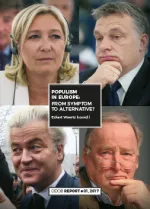The faces of populism in post-communist Romania

Since the breakdown of the former communist regime in December 1989, populism has become a familiar presence in the new Romanian democracy. The direct appeal to “the People” as the ultimate repository of truth was current during Nicolae Ceaușescu’s Nationalkommunismus, and took new ideological shapes in the post-communist period. The vacuum created by the fall of communism was partially filled by the formation of a right-wing nationalist populism articulated by the Greater Romania Party (PRM, for its acronym in Romanian). This party, led by Corneliu Vadim Tudor, Ceaușescu’s court poet, combined xenophobia, nostalgia for communism and the exaltation of the Romanian people and its pristine values and traditions. In 2000, Tudor and his party posed a serious threat to the process of democratisation in Romania. By exploiting fears triggered by unemployment, social deprivation and the collapse of the old social safety net, the extremist Tudor managed to reach the second round of the presidential elections. In the end, due to a transversal coalition of right- and left-wing forces, he was defeated by Ion Iliescu, former top Communist Party official running for the Social Democrat Party (PSDR; today the PSD).
With the decline of the PRM after the 2000 electoral failure, the Democratic Party (PD) successfully used populist rhetoric and strategies, but not in combination with nationalism and the nostalgia for Ceaușescu’s old regime. This form of populism, led by the charismatic and manipulative Traian Băsescu, was remarkably different for being – at least at the discursive level – anti-communist and pro-European. Băsescu’s populist style of leadership was much more anti-elitist and anti-establishment than Vadim’s, appealing to “the People” in order to finally topple communism “perpetuated” by the prolonged rulership of Ion Iliescu and the PSDR. The PSDR was depicted as a cartel of old political and economic elites, cheating ordinary people and protected by a corrupt judicial system. Building the whole electoral campaign around the alleged corruption of governing officials, Băsescu won the presidency in 2004, and his party (the PD) won the general elections in alliance with the National Liberal Party (PNL). One of his campaign slogans advanced the promise to “impale” corrupt state officials (i.e. rival party leaders), recalling the method used by Vlad Țepeș (Vlad the Impaler) to punish theft and corruption.
With the PD’s successful 2004 campaign populism entered a new stage: populism in government. The overall results of this shift are modest, in part because Băsescu proved to be a political opportunist with little regard for ideology. After the PD-PNL coalition broke apart (2007–2008) and President Băsescu had to cohabit with the PNL party leader as prime minister, the 2008 general elections helped the Democratic Liberal Party (PDL, the former PD) to once again form the government coalition, this time in alliance with its previous archenemy, the PSD (the supposed epitome of corruption and representative of the evil communist establishment). The successful presidential campaign in 2009, when the incumbent President Băsescu won for the second time, led to a PDL parliamentary majority and prime minister. Beginning in 2009, President Băsescu tried to transform the political system in order to consolidate his power. Claiming to speak for the people and that they would reinvigorate and modernise the state, populists turned against all bodies that intermediate representation in order to consolidate executive power. Depicting MPs as the expression of an obsolete, arrogant and corrupt elite, President Băsescu used his constitutional right to call for referenda. For instance, in one of the referenda orchestrated by Băsescu he asked for a vote on reducing by half the number of MPs and moving from a bicameral to a monocameral assembly. Led by Băsescu, the PDL changed the referendum law in 2011 and set up a 50% popular participation threshold for any referendum validation. The move turned out to be decisive in keeping Băsescu in power in 2012 when an impeachment referendum that the president lost with almost 90% of votes against him was invalidated because only 46% of voters took part.
Manipulating the mass media was another key strategy. Following favourable appointments to the direction of state TV and radio channels, hostile private TV channels have been repeatedly sanctioned by the mass media regulatory body, while their owners have been accused of various crimes and arrested. One of them died before the final sentence, while two others were convicted, sentenced and imprisoned. This “success” led Băsescu to overtly menace his rivals with legal inquiries, labelling them “prison candidates”.
With its popularity on the wane, the PDL used its power to marginalise the opposition. The two-round (run-off) majority system for electing mayors was replaced in 2011 by one more favourable to the PDL with a single round majority system. Finally, fearing a heavy defeat in the local elections scheduled for spring 2012, the PDL government decided in 2011 to suspend and postpone them. It was only the decision of the Constitutional Court that forced the PDL to abandon the plan. The electoral defeat of the PDL ended the list of abuses, with an unprecedented electoral landslide victory that confirmed in government the opposition formed by PNL and PSD in December 2012.
These political episodes in Romania confirm the tension between democratic constitutionalism and populism: the appeal to “the People” and the use of direct democracy mechanisms to mobilise social discontent and attack the establishment have turned out to be a cover for political abuses, the consolidation of executive power, and the influence of a particular economic-political elite.